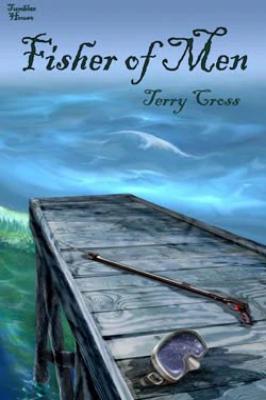
Fisher of Men
Delivery in 2-9 business days.

When people, and even great white sharks, suddenly become prey off Southern California, marine biologists Storm Hancock and Terry Ho battle through ruthless politicians, dangerous waters, and their personal quests for truth to track down a mysterious killer before it strikes again. All the while, Terry Cross's novel embraces love and beauty while blending in the foundation of the Catholic faith.
A lot of people disappear, and it is implied that a sea monster ate them, but there is nothing graphic.
Profanity: None Alcohol/Drugs/Smoking: None1.) How do your incorporate Catholic elements into the story of Fisher of Men?
Being a convert to Catholicism, I’m well aware of the misunderstandings about Catholic Christianity that negatively influence our non-Catholic Christian brothers and sisters. I wrote Fisher of Men as an ecumenical Christian novel that portrayed the Catholic Faith in a favorable, Christian light without being pushy. For example: the name of Terry’s church in Hawaii and the dialog about St. Francis of Assisi.
2.) The main character, Terry Ho, is your namesake, albeit female. What prompted that decision?
I’ve always just really liked the name -Terry. I remembered a friend from years ago who had a Hawaiian wife, and they had named their daughter Kanani (pretty one). Then, from my early surfing days pouring over Surfer Magazine I remembered pictures of Derek Ho and Michael Ho surfing the North Shore, and presto! We have the real-cool name of Terry Kanani Ho!
3.) What inspired you to write this book?
It all began in 1975 while I was a commercial abalone diver. I experimented with writing down some of the day-to-day wild experiences of that job and sending them to my mother and sister. They loved what I wrote, so I wondered if I could put a story together that my non-believing friends at the local dive shop might read and thereby think about God, even if for only the time they were reading it.
4.) Are experiences in the book based on someone you know, or events in your own life?
Saving the Marine, surfing, body surfing, free-diving Deadman’s Reef, deep diving in Palau, the Dall’s porpoises, the killer whale, spear-fishing for calico bass in the kelp, the abalone-diving, the winter-storm angel event – the list goes on and on. It all happened to me. The how-to-write-a-novel books said to write what you know, so that’s what I did.
5.) Is there a message in your novel that you want readers to grasp?
Yes, that science, reason, and faith in God are not mutually exclusive.
6.) What has been the toughest criticism given to you as an author? What has been the best compliment?
The criticism came during the fifteen years it took me to write the story. In the beginning I didn’t know enough to know what I didn’t know. Over time I learned to accept criticism, although it was never easy to read a chapter to my best critic (my wife) and have her lovingly pick it apart.
It’s a real pleasure to read reviews that say the readers lost sleep, because they couldn’t stop reading, but the best compliment was from a reader who said the book made him think about his faith.
7.) What books/authors have influenced your writing?
I had a good mentor in James L. Nelson and his historical maritime novels. He critiqued some of my work, and I would pour through his Revolution at Sea Trilogy and try to pattern my points of view, rhythm of action, and overall appearance on what I saw in his books. And I owe great thanks to Francine Rivers who took the time to read Fisher of Men and gave me the encouragement to plow ahead when the writing got tough.